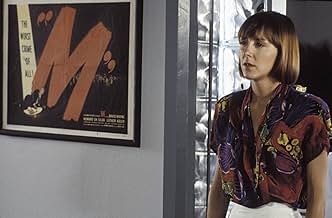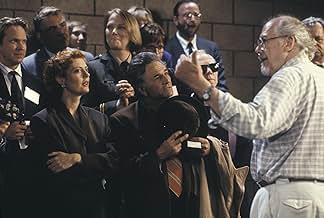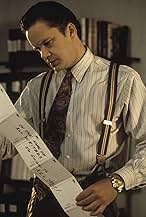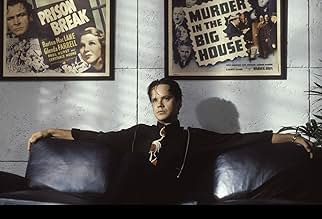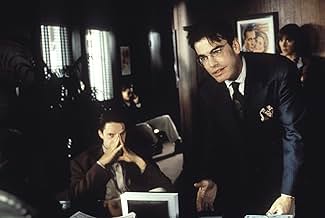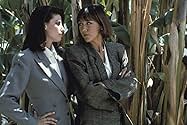Um executivo de um estúdio de Hollywood recebe ameaças de morte de um escritor que ele rejeitou, mas qual?Um executivo de um estúdio de Hollywood recebe ameaças de morte de um escritor que ele rejeitou, mas qual?Um executivo de um estúdio de Hollywood recebe ameaças de morte de um escritor que ele rejeitou, mas qual?
- Indicado a 3 Oscars
- 24 vitórias e 33 indicações no total
Avaliações em destaque
10Doc-134
Come next year, when I am trying to devise a list of the best films of the 90's, Robert Altman's "The Player" will be near the top of my list. This film skillfully creates a central plot around Griffin Mill (Tim Robbins) (who hears about 125 movie pitches per day), a studio executive who is being threatened by a writer whose script or idea he likely brushed off. But what is even more brilliant about "The Player" is everything going on peripherally to the main plot; all the references to studio techniques of film-making, foreign film movements, homages and Old Hollywood vs. New Hollywood. The film is multi-layered, yet everything that we view falls neatly into the formula which Hollywood film-making survives by. What we see in the duration of "The Player" would potentially make a perfect pitch for a movie. This may sound confusing, but watch the entire film, and you will immediately know what I mean.
The film begins with a stunning homage to Alfred Hitchcock's "Rope", an approximately eight minute long take where the camera moves freely around a studio encountering many people in the midst of their everyday routines. For example, we come across a couple discussing how Hollywood film is now much like MTV "cut, cut, cut". One of the characters even uses the example of "Rope" to illustrate his point. "Rope" is approximately a ninety minute film that appears to have been shot all in one take. Of course, it wasn't done in one take, as reels of film at that time were only ten minutes long. If one watches the film very closely, it can be determined where the cuts are made.
In the duration of the same take, we encounter Griffin Mill conducting business in his office. People walk into his office pitching movie ideas. It is here that we begin to learn about populist Hollywood film-making. Ideas, not stories or scripts are pitched to executives "in 25 words or less". Almost always, the ideas thrown out are based on previous films (e.g. "someone always gets killed at the end of a political thriller") and even combinations of previous films (e.g. "It's Pretty Woman meets Out of Africa"). When we see the usual films that are released into theaters each week, it is not difficult to believe that this is the way in which they are conceived. The usual Hollywood formula entails sex, violence, familiarity and most important of all "happy endings, a movie always has to have a happy ending".
"The Player" is filled with loads of Hollywood stars, most of them playing themselves. Jeff Goldblum, Malcolm McDowell, John Cusack, Angelica Huston, and Burt Reynolds to name a few. Many of them are encountered at restaurants during lunch and at night time Hollywood gatherings, where the topic of conversation is always movies. Near the beginning of the film, Griffin suggests that he and his lunch guests talk about something else. "We're all educated adults". Of course no one says anything. Their lives are so indoctrinated by Hollywood, they do not know what else to talk about.
Right from the beginning Griffin receives numerous postcards threatening his life. He begins to suspect a certain writer and goes to his house one night to confront him. The man turns out not to be home, but there is an incredible scene where Griffin talks with the man's girlfriend on the phone while voyeuristically watching her through the window. This is an extraordinary symbolization of the voyeuristic essence that goes along with watching a film, or the notion of scopophilia to be precise. The idea behind the concept of scopophilia is that the cinema constructs the spectator as a subject; the beholder of the gaze, who has an intense desire to look. The cinema places viewers in a voyeuristic position in that the viewer watches the film unseen in a dark room. While Griffin is watching the girl as he speaks with her, it is night time and he remains unseen to her. This scenario metaphorically represents the theater and the film.
In the duration of Griffin's conversation on the phone, he finds out that the man he is looking for is watching "The Bicycle Thief" in an art-house theater in Pasadena. This film in itself represents the first contrast to Hollywood that we see in "The Player". Vittorio DeSica's "The Bicycle Thief" was part of a movement that lasted from 1942 to 1952 called Italian Neo-Realism", whose other main exponents were Rossellini and Visconti. Rossellini called neo-realism both a moral and an aesthetic cinema. Neo-realism, to a great extent owes much of its existence to film-makers' displeasure at the restrictions placed on freedom of expression. This film movement is quite different from the modern Hollywood formula of film-making. When Griffin first meets the man he suspects is sending the postcards, he suggests that perhaps they could do a remake of "The Bicycle Thief". The man responds with "yeah sure, you'd probably want to give it a happy ending".
Also interesting in "The Player" is one of the studio executives suggestions to newspapers as a source for script ideas. This serves to contrast Old Hollywood versus New Hollywood. In the older days of studio film, Warner Brothers (one of the studio's of middle-class America) would produce films with ideas seemingly drawn from real life or from the headlines of major newspapers. This gives us the sense that often Hollywood is stuck for original ideas, so ideas from the past re-circulate themselves.
I have touched on only a few of the many interesting references that run peripherally to the main plot of "The Player". The great thing is that even if you do not catch all the film references that I have been discussing, it is still enjoyable. When I first saw the film, I was really young and did not know much about movies, but yet I enjoyed it thoroughly. Now, it is one of my favorites. I definitely recommend it to anyone who has a keen interest in film.
**** out of ****
The film begins with a stunning homage to Alfred Hitchcock's "Rope", an approximately eight minute long take where the camera moves freely around a studio encountering many people in the midst of their everyday routines. For example, we come across a couple discussing how Hollywood film is now much like MTV "cut, cut, cut". One of the characters even uses the example of "Rope" to illustrate his point. "Rope" is approximately a ninety minute film that appears to have been shot all in one take. Of course, it wasn't done in one take, as reels of film at that time were only ten minutes long. If one watches the film very closely, it can be determined where the cuts are made.
In the duration of the same take, we encounter Griffin Mill conducting business in his office. People walk into his office pitching movie ideas. It is here that we begin to learn about populist Hollywood film-making. Ideas, not stories or scripts are pitched to executives "in 25 words or less". Almost always, the ideas thrown out are based on previous films (e.g. "someone always gets killed at the end of a political thriller") and even combinations of previous films (e.g. "It's Pretty Woman meets Out of Africa"). When we see the usual films that are released into theaters each week, it is not difficult to believe that this is the way in which they are conceived. The usual Hollywood formula entails sex, violence, familiarity and most important of all "happy endings, a movie always has to have a happy ending".
"The Player" is filled with loads of Hollywood stars, most of them playing themselves. Jeff Goldblum, Malcolm McDowell, John Cusack, Angelica Huston, and Burt Reynolds to name a few. Many of them are encountered at restaurants during lunch and at night time Hollywood gatherings, where the topic of conversation is always movies. Near the beginning of the film, Griffin suggests that he and his lunch guests talk about something else. "We're all educated adults". Of course no one says anything. Their lives are so indoctrinated by Hollywood, they do not know what else to talk about.
Right from the beginning Griffin receives numerous postcards threatening his life. He begins to suspect a certain writer and goes to his house one night to confront him. The man turns out not to be home, but there is an incredible scene where Griffin talks with the man's girlfriend on the phone while voyeuristically watching her through the window. This is an extraordinary symbolization of the voyeuristic essence that goes along with watching a film, or the notion of scopophilia to be precise. The idea behind the concept of scopophilia is that the cinema constructs the spectator as a subject; the beholder of the gaze, who has an intense desire to look. The cinema places viewers in a voyeuristic position in that the viewer watches the film unseen in a dark room. While Griffin is watching the girl as he speaks with her, it is night time and he remains unseen to her. This scenario metaphorically represents the theater and the film.
In the duration of Griffin's conversation on the phone, he finds out that the man he is looking for is watching "The Bicycle Thief" in an art-house theater in Pasadena. This film in itself represents the first contrast to Hollywood that we see in "The Player". Vittorio DeSica's "The Bicycle Thief" was part of a movement that lasted from 1942 to 1952 called Italian Neo-Realism", whose other main exponents were Rossellini and Visconti. Rossellini called neo-realism both a moral and an aesthetic cinema. Neo-realism, to a great extent owes much of its existence to film-makers' displeasure at the restrictions placed on freedom of expression. This film movement is quite different from the modern Hollywood formula of film-making. When Griffin first meets the man he suspects is sending the postcards, he suggests that perhaps they could do a remake of "The Bicycle Thief". The man responds with "yeah sure, you'd probably want to give it a happy ending".
Also interesting in "The Player" is one of the studio executives suggestions to newspapers as a source for script ideas. This serves to contrast Old Hollywood versus New Hollywood. In the older days of studio film, Warner Brothers (one of the studio's of middle-class America) would produce films with ideas seemingly drawn from real life or from the headlines of major newspapers. This gives us the sense that often Hollywood is stuck for original ideas, so ideas from the past re-circulate themselves.
I have touched on only a few of the many interesting references that run peripherally to the main plot of "The Player". The great thing is that even if you do not catch all the film references that I have been discussing, it is still enjoyable. When I first saw the film, I was really young and did not know much about movies, but yet I enjoyed it thoroughly. Now, it is one of my favorites. I definitely recommend it to anyone who has a keen interest in film.
**** out of ****
"Players only love you when they're playing." --Stevie Nicks
Griffin Mill, whose name has a kind of ersatz Hollywood feel to it (cf., D. W. Griffith/Cecil B. De Mille), is not a player with hearts so much as a player with dreams. He is a young and powerful film exec who hears thousands of movie pitches a year, but can only buy twelve. So he must do a lot of dissembling, not to mention outright lying, along with saying "We'll get back to you," etc. This is what he especially must say to writers. And sometimes they hold a grudge. In this case one of the rejected writers begins to stalk Griffin Mill and send him threatening postcards. And so the plot begins.
Tim Robbins, in a creative tour de force, plays Griffin Mill with such a delightful, ironic charm that we cannot help but identify with him even as he violates several layers of human trust. The script by Michael Tolkin smoothly combines the best elements of a thriller with a kind of Terry Southern satirical intent that keeps us totally engrossed throughout. The direction by Robert Altman is full of inside Hollywood jokes and remembrances, including cameos by dozens of Hollywood stars, some of whom get to say nasty things about producers. The scenes are well-planned and then infused with witty asides. The tampon scene at police headquarters with Whoopi Goldberg is an hilarious case in point, while the sequence of scenes from Greta Scacchi's character's house to the manslaughter scene outside the Pasadena Rialto, is wonderfully conceived and nicely cut. Also memorable is the all black and white dress dinner scene in which Cher is the only person in red, a kind of mean or silly joke, depending on your perspective. During the same scene Mill gives a little speech in which he avers that "movies are art," a statement that amounts to sardonic irony since, as a greedy producer, he cares nothing at all about art, but only about box office success. His words also form a kind of dramatic irony when one realizes that this movie itself really is a work of art. As Altman observes in a trailing clip, the movie "becomes itself." The Machiavellian ending illustrates this with an almost miraculous dovetailing. This is the kind of script that turns most screen writers Kermit-green with envy.
Incidentally, Joe Gillis, the Hollywood writer played by William Holden in Sunset Boulevard--personifying all unsuccessful screen writers--actually does call during the movie, but Mill doesn't recognize the name and has to be told he is being put on, further revealing the narrow confines of his character.
In short, this is a wonderfully clever, diabolically cynical satire of Hollywood and the movie industry. This is one of those movies that, if you care anything at all about film, you must see. Period. It is especially delicious if you hate Hollywood. It is also one of the best movies ever made about Hollywood, to be ranked up there with A Star is Born (1937) (Janet Gaynor, Fredric March); Sunset Boulevard (1950); A Star is Born (1954) (Judy Garland, James Mason); and Postcards from the Edge (1990).
I must add that in the annals of film, this has to go down as one of the best Hollywood movies not to win a single Academy Award, although it was nominated for three: Best Director, Best Adapted Screenplay and Best Editing. I suspect the Academy felt that the satire hit a little too close to home for comfort.
(Note: Over 500 of my movie reviews are now available in my book "Cut to the Chaise Lounge or I Can't Believe I Swallowed the Remote!" Get it at Amazon!)
Griffin Mill, whose name has a kind of ersatz Hollywood feel to it (cf., D. W. Griffith/Cecil B. De Mille), is not a player with hearts so much as a player with dreams. He is a young and powerful film exec who hears thousands of movie pitches a year, but can only buy twelve. So he must do a lot of dissembling, not to mention outright lying, along with saying "We'll get back to you," etc. This is what he especially must say to writers. And sometimes they hold a grudge. In this case one of the rejected writers begins to stalk Griffin Mill and send him threatening postcards. And so the plot begins.
Tim Robbins, in a creative tour de force, plays Griffin Mill with such a delightful, ironic charm that we cannot help but identify with him even as he violates several layers of human trust. The script by Michael Tolkin smoothly combines the best elements of a thriller with a kind of Terry Southern satirical intent that keeps us totally engrossed throughout. The direction by Robert Altman is full of inside Hollywood jokes and remembrances, including cameos by dozens of Hollywood stars, some of whom get to say nasty things about producers. The scenes are well-planned and then infused with witty asides. The tampon scene at police headquarters with Whoopi Goldberg is an hilarious case in point, while the sequence of scenes from Greta Scacchi's character's house to the manslaughter scene outside the Pasadena Rialto, is wonderfully conceived and nicely cut. Also memorable is the all black and white dress dinner scene in which Cher is the only person in red, a kind of mean or silly joke, depending on your perspective. During the same scene Mill gives a little speech in which he avers that "movies are art," a statement that amounts to sardonic irony since, as a greedy producer, he cares nothing at all about art, but only about box office success. His words also form a kind of dramatic irony when one realizes that this movie itself really is a work of art. As Altman observes in a trailing clip, the movie "becomes itself." The Machiavellian ending illustrates this with an almost miraculous dovetailing. This is the kind of script that turns most screen writers Kermit-green with envy.
Incidentally, Joe Gillis, the Hollywood writer played by William Holden in Sunset Boulevard--personifying all unsuccessful screen writers--actually does call during the movie, but Mill doesn't recognize the name and has to be told he is being put on, further revealing the narrow confines of his character.
In short, this is a wonderfully clever, diabolically cynical satire of Hollywood and the movie industry. This is one of those movies that, if you care anything at all about film, you must see. Period. It is especially delicious if you hate Hollywood. It is also one of the best movies ever made about Hollywood, to be ranked up there with A Star is Born (1937) (Janet Gaynor, Fredric March); Sunset Boulevard (1950); A Star is Born (1954) (Judy Garland, James Mason); and Postcards from the Edge (1990).
I must add that in the annals of film, this has to go down as one of the best Hollywood movies not to win a single Academy Award, although it was nominated for three: Best Director, Best Adapted Screenplay and Best Editing. I suspect the Academy felt that the satire hit a little too close to home for comfort.
(Note: Over 500 of my movie reviews are now available in my book "Cut to the Chaise Lounge or I Can't Believe I Swallowed the Remote!" Get it at Amazon!)
For anyone who loves movies, "The Player" is a treat.
To start, the screenplay is first-rate. The plot that holds the entire film together is superbly crafted; very few films leave you guessing right to the end as this one does. The finer details also shine through, such as the sales pitch scenes, which are inarguably classic (i.e. "The Graduate II").
I loved the attention to detail in "The Player". One can find a new detail every time one watches the film. For example, the opening sequence is a very long, continuous shot during which characters are discussing Hitchcock's "Rope", which appears to be a movie filmed all in one continuous shot. The sheer number of cameos in "The Player" makes it difficult to list all of them, so I won't even try.
"The Player" is one film that sets out to skewer Hollywood and actually succeeds. One only has to view the Bruce Willis/Julia Roberts sequence in order to understand this. My hat goes off to Robert Altman for making another excellent film.
To start, the screenplay is first-rate. The plot that holds the entire film together is superbly crafted; very few films leave you guessing right to the end as this one does. The finer details also shine through, such as the sales pitch scenes, which are inarguably classic (i.e. "The Graduate II").
I loved the attention to detail in "The Player". One can find a new detail every time one watches the film. For example, the opening sequence is a very long, continuous shot during which characters are discussing Hitchcock's "Rope", which appears to be a movie filmed all in one continuous shot. The sheer number of cameos in "The Player" makes it difficult to list all of them, so I won't even try.
"The Player" is one film that sets out to skewer Hollywood and actually succeeds. One only has to view the Bruce Willis/Julia Roberts sequence in order to understand this. My hat goes off to Robert Altman for making another excellent film.
Robert Altman gets under my skin. His films are worthy of great respect, yet they are frequently as irritating as they are brilliant. The Player is, as much as Short Cuts, a quintessential Altman film. It is also one of the best roles Tim Robbins has ever enjoyed.
This film is about Hollywood's dark underbelly. The Player eviscerates its subject by twisting justice, political gamesmanship and artistic integrity into new configurations. For non-film-buffs or non-professionals some of the humor may seem too subtle to notice. To film buffs and insiders, the humor is totally over the top.
Robbins plays a young studio exec who is playing the game to win and seems, at least part of the time, to have a conscience. Everything is going along fine for him until he starts receiving threatening calls and letters from a writer whose screenplays he has rejected, and an arch-rival is promoted to a position just above his own. Paranoia and real danger seem in the periphery of every scene in his life, as the make-believe of his industry and the reality of his life begin to blend freely.
Robbins makes a character who could easily have been totally unlikeable somehow sympathetic. Despite his amazing performance, liking the character makes you feel as if you should go stand in a shower and exfoliate for an hour or so. He is supported by excellent supporting work all around. Especially good are the two major women's roles - played by Greta Scachi and Bonnie Sherrow, and veteran camp character Dean Stockwell.
The photography is liberally and amusingly lifted from several classic thrillers, mysteries and dramas, and comes off fresh and original - not at all like a DePalmaesque bit of visual plagiarism. And the pace is brisk.
The Player is probably my favorite Altman film, and it is easily my favorite Tim Robbins film. It's entertaining, intelligent and, well, it has a bad attitude. See it some night when you're angry and you need a good dark laugh.
This film is about Hollywood's dark underbelly. The Player eviscerates its subject by twisting justice, political gamesmanship and artistic integrity into new configurations. For non-film-buffs or non-professionals some of the humor may seem too subtle to notice. To film buffs and insiders, the humor is totally over the top.
Robbins plays a young studio exec who is playing the game to win and seems, at least part of the time, to have a conscience. Everything is going along fine for him until he starts receiving threatening calls and letters from a writer whose screenplays he has rejected, and an arch-rival is promoted to a position just above his own. Paranoia and real danger seem in the periphery of every scene in his life, as the make-believe of his industry and the reality of his life begin to blend freely.
Robbins makes a character who could easily have been totally unlikeable somehow sympathetic. Despite his amazing performance, liking the character makes you feel as if you should go stand in a shower and exfoliate for an hour or so. He is supported by excellent supporting work all around. Especially good are the two major women's roles - played by Greta Scachi and Bonnie Sherrow, and veteran camp character Dean Stockwell.
The photography is liberally and amusingly lifted from several classic thrillers, mysteries and dramas, and comes off fresh and original - not at all like a DePalmaesque bit of visual plagiarism. And the pace is brisk.
The Player is probably my favorite Altman film, and it is easily my favorite Tim Robbins film. It's entertaining, intelligent and, well, it has a bad attitude. See it some night when you're angry and you need a good dark laugh.
Griffin Mill is a young hotshot producer who everyone bows and scrapes to because he has the powers to get a movie made. However he starts getting bugged by a dissatisfied writer which leads to all kinds of deadly intrigue.
Just when I thought Altman had gone totally off-the-boil he suddenly jumps back with his most perfectly realised film. While hardly unapplauded on its release (and in short retrospect) this is a movie that will be regarded by future generations as a classic. It is so smart, sassy, funny and has a beginning, a middle and an end. The kind of tragicomedy that gets the best of both worlds.
Robbins is perfect as the lead. He doesn't do much or emote much. As Robert De Niro once said "most people don't show their emotions, they hide them." Occasionally we get behind the shield of human indifference, but only occasionally. We don't like him much - nor should we - but he is not so bad that we can't bare him. Indeed he is merely someone whose selfish world gets out of control. Whoopie Goldberg makes the most of her unlikely casting too.
The appearance of stars in guest parts adds a bit of icing, but that is all. I loved Altman's directions to the stars who had to play walk-ons (who else could have got that?) "remember, you are responsible for who you are on screen. You are playing yourselves!"
The sexy Scacchi plays the love interest with great skill. While just a muse she is a far better actress than most and this shows in her short screen time. Shame she hasn't more involvement in the main plot.
Like breaking a car down in to its competent parts, taking The Player apart only leaves an ugly mess of oil and metal. Together it drives a tight little film that has insight, drama and comedy. I would hesitate to call this a masterpiece, but it is a mini-masterpiece that however farfetched never reaches the point of being totally unbelievable.
The pay off at the end is one of the best belly-laughs any film buff could ever get. I doubt I will see a better film about modern day Hollywood in my lifetime. Like Pulp Fiction, a film that is as enjoyable the second time of viewing as the first.
Just when I thought Altman had gone totally off-the-boil he suddenly jumps back with his most perfectly realised film. While hardly unapplauded on its release (and in short retrospect) this is a movie that will be regarded by future generations as a classic. It is so smart, sassy, funny and has a beginning, a middle and an end. The kind of tragicomedy that gets the best of both worlds.
Robbins is perfect as the lead. He doesn't do much or emote much. As Robert De Niro once said "most people don't show their emotions, they hide them." Occasionally we get behind the shield of human indifference, but only occasionally. We don't like him much - nor should we - but he is not so bad that we can't bare him. Indeed he is merely someone whose selfish world gets out of control. Whoopie Goldberg makes the most of her unlikely casting too.
The appearance of stars in guest parts adds a bit of icing, but that is all. I loved Altman's directions to the stars who had to play walk-ons (who else could have got that?) "remember, you are responsible for who you are on screen. You are playing yourselves!"
The sexy Scacchi plays the love interest with great skill. While just a muse she is a far better actress than most and this shows in her short screen time. Shame she hasn't more involvement in the main plot.
Like breaking a car down in to its competent parts, taking The Player apart only leaves an ugly mess of oil and metal. Together it drives a tight little film that has insight, drama and comedy. I would hesitate to call this a masterpiece, but it is a mini-masterpiece that however farfetched never reaches the point of being totally unbelievable.
The pay off at the end is one of the best belly-laughs any film buff could ever get. I doubt I will see a better film about modern day Hollywood in my lifetime. Like Pulp Fiction, a film that is as enjoyable the second time of viewing as the first.
Você sabia?
- CuriosidadesThe celebrity cameos were not written in the script. Robert Altman added them all in. No scripted dialogue was given to any celebrity with a cameo.
- Erros de gravaçãoWhen Mill reads the newspaper story about the murder, a closeup of article reveals that it is just the same few paragraphs printed over and over.
- Citações
Griffin Mill: It lacked certain elements that we need to market a film successfully.
June: What elements?
Griffin Mill: Suspense, laughter, violence. Hope, heart, nudity, sex. Happy endings. Mainly happy endings.
June: What about reality?
- Cenas durante ou pós-créditosTim Robbins, Fred Ward and Cynthia Stevenson all enter the film when their names appear in the opening credits.
- Versões alternativasIn the theatrical version there was a frontal nude scene of Tim Robbins at the hotel in the desert. This scene was removed for the cable version.
Principais escolhas
Faça login para avaliar e ver a lista de recomendações personalizadas
- How long is The Player?Fornecido pela Alexa
Detalhes
- Data de lançamento
- País de origem
- Idioma
- Também conhecido como
- El ejecutivo
- Locações de filme
- 1921 Westholme Ave, Los Angeles, Califórnia, EUA(June Gudmundsdottir's house)
- Empresas de produção
- Consulte mais créditos da empresa na IMDbPro
Bilheteria
- Orçamento
- US$ 8.000.000 (estimativa)
- Faturamento bruto nos EUA e Canadá
- US$ 21.706.101
- Fim de semana de estreia nos EUA e Canadá
- US$ 302.216
- 12 de abr. de 1992
- Faturamento bruto mundial
- US$ 21.706.547
- Tempo de duração
- 2 h 4 min(124 min)
- Cor
- Mixagem de som
- Proporção
- 1.85 : 1
Contribua para esta página
Sugerir uma alteração ou adicionar conteúdo ausente



